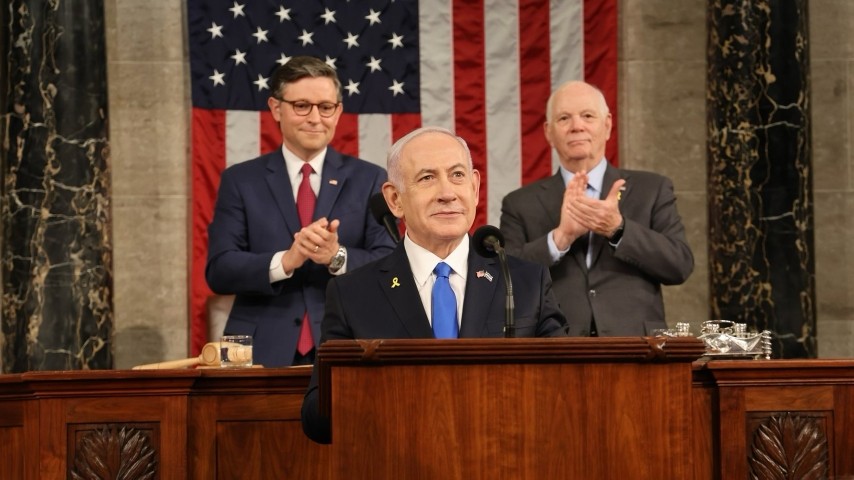The Ceasefire In Gaza Is Not An End
Photo by Office of Speaker Mike Johnson, Public domain, via Wikimedia Commons
There is, at least, a pause. After 15 months of almost continuous mass slaughter, bombs, for the time being, are not being dropped on Gaza. The ever-rising official death toll has tipped past 48,000 people, nearly 18,000 of whom were children, but it will continue to grow in the coming weeks and months, as mangled bodies are pulled from the rubble. The true number will probably never be known, in part due to all those bodies that were literally evaporated in the fires of Israeli explosives. The world has made it clear there will be no accounting for them.
The injured of Gaza are said to number 111,000 or so, with close to a quarter of those, according to the World Health Organization, bearing “life-changing injuries.” Blinded eyes; charred skin; torn limbs; shattered spines. Statistics, though, will struggle to account for the trauma, born of 15 months of ceaseless psychological torture and bereavement. Do mental scars constitute “life-changing” injuries? Are ongoing mass starvation and disease noted in the stats?
There is a pause now in the genocide, but there will be no end to the violence. There will be no justice nor peace. Israel’s project of ethnic cleansing and apartheid will endure, and, at any moment, the ceasefire may break and the genocide will resume, as Israeli settler attacks backed by the army in the West Bank demonstrate. It is only a temporary pause in the war, any extensions subject to negotiation, with its first phase set to last for six weeks. Talks will be held during phase one, the outcome of which will determine if and how phase two can be implemented. Should the second phase fail to meet Israel’s standards, Benjamin Netanyahu has publicly asserted Israel’s right to start the war up again, while phase three is, as yet, entirely vague.
-

-

-

-

-

-

-

-

-

-

-

-

-

-

-

-

-

-

-

-

-

-

-

-

-

-

-

-

-

-

-

-

-

-

-

-

-

-

-

-

-

-

-

-

-

-

-

-

-

-

-

-

-

-

-

-

-

-

-

-

-

-

-

-

-

-

-

-

-

-

-

-

-

-

-

-

-

-

-

-

-

-

-

-

-

-

-

-

-

-

-

-

-

-

-

-

-

-

-

-

-

-

-

-

-

-

-

-












































































































